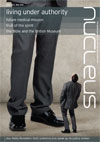One fascinating conversation in heaven will be that between John and Jeremiah. Tim Chester's talks on Revelation at the CMF Student Conference reminded me of the contrast between Jeremiah's instructions to the Jews in Babylon (Jeremiah 29), and John's account of Babylon's fall (Revelation 18). When Babylon falls, a voice from heaven says '"Come out of her, my people", so that you will not share in her sins'; yet Jeremiah's instructions include 'seek the peace and prosperity of the city to which I have carried you to exile'.
Although the Babylon of Revelation 18 is clearly symbolic, representing the anti-Christian system of the world, it seems little different from the literal Babylon of Jeremiah 29 where the Jews had been taken in exile. So why are the instructions different? Contrasting trajectories in Scripture aren't unusual, and may explain things better than a list of rules; but I'd still be keen to hear how John and Jeremiah work it out!
What about us? Peter describes his readers as 'exiles' (1 Peter 1:1, 2:11). We do not yet live in our true heavenly home. As exiles on earth, both John's and Jeremiah's principles matter. How then should we act?
Both 'seek the peace of the city' and 'come out of her' are appropriate at different times. For UK students training in the NHS, Jeremiah's path often seems the more obvious. There are opportunities to strengthen the system in which we work and study, perhaps through the student union or local BMA committee. We should pray for those we work with and learn from, and study so we can care competently and compassionately for our patients.
Yet difficulties arise. The NHS is a fallen system. The current dispute over junior doctors' contracts, ethical problems, questions over funding and rationing, along with previous scandals, make clear that we contend with the problems of a fallen world. However laudable the principle of care provided free at the point of need, this does not mean that the NHS is free of problems, or guaranteed to be around for ever.
So sometimes 'come out of her' is the right response. We may avoid some parts of medical school culture; or exercise the rights that currently protect us from having to participate in abortion. Later in our careers, we may want to set up or work as part of a Christian organisation that provides healthcare.
As the population continues to age, and expectations continue to rise, pressures within UK healthcare are only likely to increase. The space for caring compassionately or talking about faith will continue to be squeezed, and 'come out of her' may become the only response for those who want to practise in a particular way.
The key now is to see the situation as it really is; acknowledge that we are exiles working in a fallen world, and pray for confidence that God's way really is the best way, even when it is hard to follow in our studies and work. Then we will be prepared to discern and follow his will, even if there is more challenge as the future unfolds.
































